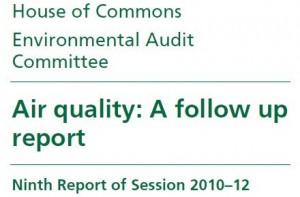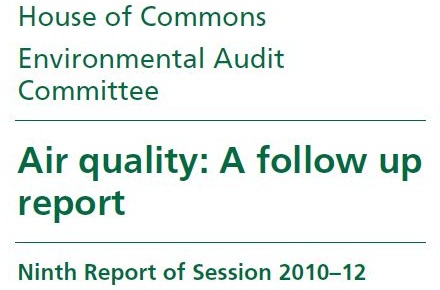The House of Commons Environmental Audit Select Committee have reported that there is ‘no meaningful evidence’ to suggest that the Government is making progress towards resolving dangerous levels of air pollution in the UK. In the meantime more evidence has come to light about how air pollution shortens our lives and causes severe illness.
 |
| [relatedPosts title=”Related Posts”] |
|
|
The report, a follow up to the Committee’s previous inquiry into air quality last year, uncovered new health evidence suggesting that nearly 200,000 people in the UK die prematurely due to air pollution annually, with a loss of life expectancy averaging 2 years. Studies also suggest that living near busy roads could account for 15-30% of new cases of asthma in children, and a similar percentage of cases of chronic obstructive pulmonary disease and coronary heart disease in adults aged over 65.
In the face of this public health crisis the Committee found that the Government response was inadequate. It reports that the lead department for air quality (DEFRA) has failed to even include air quality in its business plan, a symptom of the low priority placed on air quality by the Government.
The report also highlights that air pollution has a disproportionate affect on disadvantaged communities, citing studies that link areas of poor air quality with low income, low employment and low educational attainment.
The MPs have recommended a step change in the Government’s response to the air quality crisis, with a new cross-departmental air quality strategy co-ordinated by the Cabinet Office at its heart. They also suggest that awareness of air quality amongst the general public is currently poor, and a large public awareness campaign is the single most important action the Government could take to both encourage people to help reduce polluting activities and also reduce their exposure to polluted air.
James Grugeon, CEO of Environmental Protection UK, said:
“This report confirms that the Government is placing an extraordinarily low priority on resolving the public health crisis caused by air pollution. The fact that air quality does not even make the lead department’s business plan speaks volumes about the Government’s complacency and inaction on this issue.”
“The Government must now follow the Committee’s well reasoned suggestions and deliver a true cross-departmental strategy to comply urgently and fully with the air pollution targets the UK has failed to meet.”
Lewis Merdler of the Healthy Air Campaign, led by Environmental Protection UK and supported by a coalition of transport, health and environment NGOs, said:
“The Committee has clearly spelt out the health problems caused by air pollution – polluted air causes heart and lung disorders and ultimately shortens lives.”
“Most people aren’t aware of the serious health threats posed by air pollution – this report says a public awareness campaign is the number one action we can take to meeting cleaner air targets.”
“Understanding the problem could help us all take simple steps to reduce both our own and our families’ exposure to polluted air.”
Further Information
- The 9th Report – Air Quality: a follow-up – Volume I PDF is available here.
- The 9th Report – Air Quality: a follow-up – Volume II PDF is available here.
- Air Quality: A follow up report – corrected evidence – 6 July 2011 is available here.
- Environmental Protection UK (EPUK) has produced a briefing note on the EAC report. This can be downloaded here>.
- The UK has some of the worst air pollution in Europe, with levelsbreaching legally binding, health based European limits in many of our towns and cities. The Government’s own figures, as reported to the European Commission, show that over 900,000 people in the UK were exposed to illegal concentrations of the pollutant nitrogen dioxide in 2010.
- The Committee on the Medical Effects of Air Pollution (COMEAP) estimates that 29,000 premature deaths in the UK in 2008 were attributable to long-term exposure to airborne particulate matter PM2.5.The COMEAP Report, The Mortality Effects of Long-Term Exposure to Particulate Air Pollution in the United Kingdom is available here: http://comeap.org.uk/documents/reports.html
- The Aphekom group has reported that living near busy roads could be responsible for some 15-30% of all new cases of asthma in children; and of chronic obstructive pulmonary disease and coronary heart disease in adults 65 years of age and older.The report, Improving Knowledge and Communication for Decision Making on Air Pollution and Health in Europe 2008-2011, is available at: http://www.aphekom.org/web/aphekom.org/home





